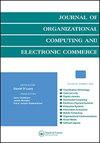HOW DOES INFORMATION DISCLOSURE OF CRYPTOCURRENCY WHITEPAPER AFFECT INITIAL COIN OFFERING FUNDRAISING SUCCESS?
IF 1.9
4区 管理学
Q3 COMPUTER SCIENCE, INFORMATION SYSTEMS
Journal of Organizational Computing and Electronic Commerce
Pub Date : 2023-04-03
DOI:10.1080/10919392.2023.2241824
引用次数: 0
Abstract
ABSTRACT The main function of the initial coin offering (ICO) whitepaper is to eliminate the impact of information mismatch between investment and financing parties. Based on signaling theory, this study analyzes the factors that affect the success of ICOs. To analyze the impact of the disclosure of whitepapers on successful ICO fundraising, the whitepaper information is classified into four directions: fundraising characteristics, project characteristics, human capital, and social capital. At the same time, supplement the ICO project information regarding each cryptocurrency with public information on their official website and social media, ensuring the timeliness and integrity of the analyzed data. Analyze the impact of disclosure on the success of an ICO by constructing a logistic regression model. Due to the two extremes of regulation for cryptocurrency in different countries, either their registration is forbidden or the absence of regulation, resulting in the lack of uniform standards for the information disclosed in the whitepaper, and it is difficult to distinguish between true and false. Low-quality information disclosure has little impact on the successful financing of ICOs and has limited reference value to cryptocurrency investors and investors alike.加密货币白皮书的信息披露如何影响首次代币发行筹款的成功?
摘要首次代币发行(ICO)白皮书的主要功能是消除投融资方之间信息不匹配的影响。基于信号传导理论,本研究分析了影响ICO成功的因素。为了分析白皮书披露对ICO成功筹款的影响,将白皮书信息分为四个方向:筹款特征、项目特征、人力资本和社会资本。同时,在每个加密货币的官方网站和社交媒体上用公开信息补充ICO项目信息,确保分析数据的及时性和完整性。通过构建逻辑回归模型,分析披露对ICO成功的影响。由于不同国家对加密货币的监管存在两个极端,要么禁止注册,要么缺乏监管,导致白皮书中披露的信息缺乏统一的标准,也很难区分真伪。低质量的信息披露对ICO的成功融资影响不大,对加密货币投资者和投资者的参考价值有限。
本文章由计算机程序翻译,如有差异,请以英文原文为准。
求助全文
约1分钟内获得全文
求助全文
来源期刊

Journal of Organizational Computing and Electronic Commerce
工程技术-计算机:跨学科应用
CiteScore
5.80
自引率
17.20%
发文量
7
审稿时长
>12 weeks
期刊介绍:
The aim of the Journal of Organizational Computing and Electronic Commerce (JOCEC) is to publish quality, fresh, and innovative work that will make a difference for future research and practice rather than focusing on well-established research areas.
JOCEC publishes original research that explores the relationships between computer/communication technology and the design, operations, and performance of organizations. This includes implications of the technologies for organizational structure and dynamics, technological advances to keep pace with changes of organizations and their environments, emerging technological possibilities for improving organizational performance, and the many facets of electronic business.
Theoretical, experimental, survey, and design science research are all welcome and might look at:
• E-commerce
• Collaborative commerce
• Interorganizational systems
• Enterprise systems
• Supply chain technologies
• Computer-supported cooperative work
• Computer-aided coordination
• Economics of organizational computing
• Technologies for organizational learning
• Behavioral aspects of organizational computing.
 求助内容:
求助内容: 应助结果提醒方式:
应助结果提醒方式:


